
Egg
Heart disease is a leading cause of death in every part of the world, there has been a perception that eating eggs raises your cholesterol indeed this has been the case for a very long time but new research has proven that eggs can be good for us.
I just love eating eggs, they are so versatile in the different ways that you can eat them, poached, scrambled, fried, omelet, eggs with bacon, or quiche.
The list is endless but is there a connection between heart disease and eggs? or do eggs cause heart disease?
 What do the doctors say?
What do the doctors say?
Many doctors will advise you to stop eating eggs if you have a history of heart disease in your family and your cholesterol is high, this advice would make you believe that eating eggs will lead you to get some form of heart disease because the belief is that eggs raise your cholesterol levels.
High cholesterol has been proven to be the leading cause of cardiovascular disease so we should stay away from eggs right?
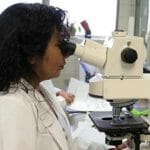
Scientific studies
What do scientific studies say?
Many noteworthy studies have shown that the link between your intake of eggs and heart disease is quite tenuous and weak. Eggs are good for you, egg white is a good source of protein and it is rich in essential amino acids, our bodies need these amino acids for good health, but our bodies don’t make these essential acids so we need to get them from the food that we eat.
Eggs contain protein and this gives your body the energy that it needs to function every day, children need protein to build muscles, and older people need protein to stop a decline in muscle mass.
What else are eggs good for?
Cataract
The egg white contains more than 50% protein, it also has Vitamin B2, there is also less fat than in the yolk of the egg, eggs are selenium-rich and contain other vitamins B6, B12, and Vitamin D along with important minerals iron, zinc, and copper. There are more fat and calories in the egg yoke a source of fat-soluble Vitamins A, D, and K an a compound lecithin.
Eggs contain Lucien which protects your eyes from degenerative eye-related cataracts, eggs also contain cholesterol, is this a problem for your heart health?
Research:
According to some research done on the effect of eating eggs regularly and your cholesterol, it was found that in people who are generally healthy eating a couple of eggs each day will not affect your cholesterol level, however other research supported the theory that egg yolk may even elevate the healthy fats preventing blood clots to form.
High cholesterol
People with high cholesterol are advised not to eat eggs every day but rather one egg up to four times a week or use a lower-cholesterol egg.
Egg yolk is a useful source of choline, this vitamin is important for your memory and brain development especially when you are younger, choline is also good for your heart because it converts homocysteine a molecule into a safer material.
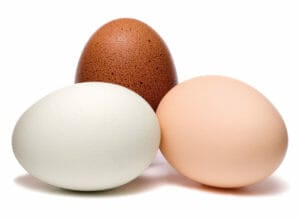
Eggs
Nutrition in eggs
Don’t worry about putting on weight from eating eggs, they are relatively low in calories and are so simple and easy to prepare as food. Newer research has proved that eggs are much healthier than was previously thought so people are being encouraged to eat more eggs.
When buying eggs watch out for the amount of the levels of Omega 3 and 6 in the eggs, you need more of the omega 3 fatty acids and less of the omega 6.
Heart disease and eggs
Based on the evidence gathered from the various studies it would seem that overall eggs are good for your overall health especially your heart health, however people with high cholesterol should only eat no more than four eggs per week.
For many years, eggs have been a controversial food when it comes to heart health. Some studies have suggested that eating eggs may increase the risk of heart disease, while others have found no link. So, what’s the truth?
Eggs are indeed high in cholesterol, with a single large egg containing about 186 mg of cholesterol. Cholesterol is a type of fat that is found in the blood and is necessary for many body functions, including the production of hormones and the formation of cell membranes. However, excess cholesterol can contribute to the development of plaque in the arteries, which can increase the risk of heart disease.
However, it’s important to note that dietary cholesterol (the type of cholesterol found in food) only has a small effect on blood cholesterol levels. Saturated and trans fats, which are found in many processed and fried foods, have a much greater impact on blood cholesterol levels.
In addition, there are many other nutrients found in eggs that may benefit heart health. Eggs are a good source of protein, which can help lower blood pressure and improve blood sugar control. They also contain antioxidants and other nutrients, such as lutein and zeaxanthin, which may have heart-protective effects.
Overall, the evidence suggests that moderate egg consumption (up to one egg per day) is not likely to increase the risk of heart disease in most people. However, it’s important to keep in mind that eggs should be consumed as part of a balanced diet that includes a variety of healthy foods. If you have high cholesterol or a history of heart disease, it may be a good idea to speak with a healthcare provider about your egg intake.
In summary, while eggs do contain cholesterol, they can still be a part of a healthy diet for most people. It’s important to focus on the overall quality of your diet and to limit your intake of saturated and trans fats, rather than solely focusing on cholesterol from food sources. As always, it’s a good idea to speak with a healthcare provider about your individual needs and dietary recommendations.
Lower cholesterol naturally with Cholesterol Optimizer
With such a self-explanatory name, Cholelso and Dr. Sam Robbins and the employees have cultivated a company focused on providing natural proactive supplements for many health conditions associated with growing older, over the past 20 years.
However, this doesn’t mean that to take their supplements you need to be on the cusp of 80 or 90 – these health conditions can be extremely common among people across all age groups. For example:
- High cholesterol.
- High blood pressure.
- Cardiovascular disease.
- Blocked arteries.
- Peripheral artery disease.
References:
https://time.com/5285672/eggs-lower-heart-disease-stroke/
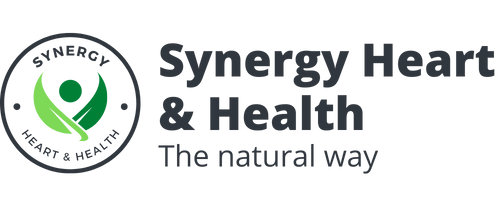
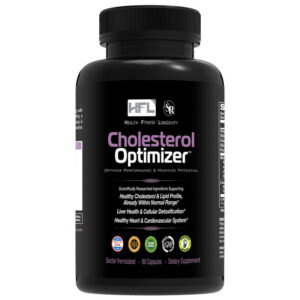
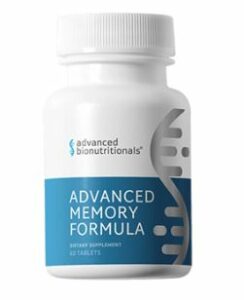

Leave a Reply
Leave a reply here